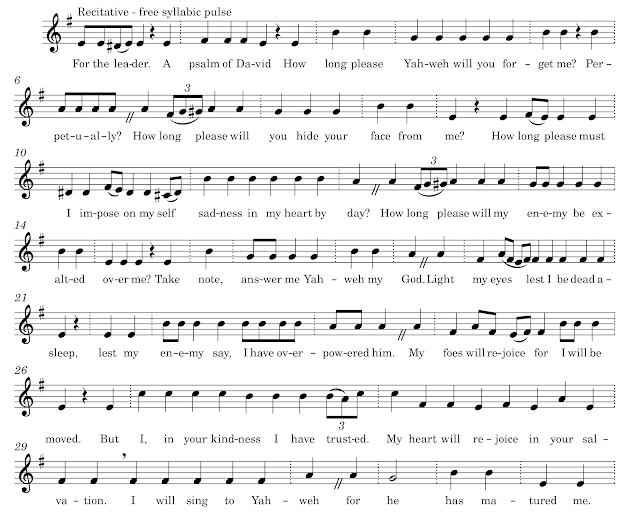Psalms - called in the plural since that's the name of the book. The Hebrew name is plural thilm, the 14th book of the Bible, the first of the third division of the Hebrew Bible, Writings or ctubim.

|
| Psalms 13: Tenor: B 25.40%; Ornament density: 10.4%; Average phrase length: 10.4. |
| 1 For the leader. A psalm of David. (1-1) | |||
| א למנצ֗ח מזמ֥ור לדוֽד | 9 |
a lmnxk mzmor ldvid | |
| 2 How long please Yahweh will you forget me? perpetually? How long please will you hide your face from me? (1-4-1) | |||
| ב עד־א֣נה י֭הוה תשכח֣ני נ֑צח עד־א֓נה תסת֖יר את־פנ֣יך ממֽני |
11 12 |
b yd-anh ihvh twckni nxk yd-anh tstir at-pniç mmni | |
| 3 How long please must I impose advice on myself, sadness in my heart by day? How long please will my enemy be exalted over me? (1-4-1) | |||
| ג עד־א֨נה אש֪ית עצ֡ות בנפש֗י יג֣ון בלבב֣י יומ֑ם עד־א֓נה יר֖ום איב֣י עלֽי |
17 9 |
g yd-anh awit yxot bnpwi igon blbbi iomm yd-anh irum aoibi ylii | |
| 4 Take note - answer me Yahweh my God. Light my eyes, lest I be dead asleep, (1-4-1) | |||
| ד הב֣יטֽה ע֭נני יהו֣ה אלה֑י הא֥ירה ע֝ינ֗י פן־איש֥ן המֽות |
11 11 |
d hbiTh ynni ihvh alohii hairh yinii pn-aiwn hmvvt | |
| 5 lest my enemy say, I have overpowered him. My foes will rejoice, for I will be moved. (1-4-1) | |||
| ה פן־יאמ֣ר איב֣י יכלת֑יו צר֥י י֝ג֗ילו כ֣י אמֽוט |
8 8 |
h pn-iamr aoibi icoltiv xrii igilu ci amoT | |
| 6 But I, in your kindness I have trusted. My heart will rejoice in your salvation. I will sing to Yahweh, for he has matured me. (1-2-4-1) | |||
| ו ואנ֤י בחסדך֣ בטחתי֮ י֤ג֥ל לב֗י בֽישוע֫ת֥ך אש֥ירה ליהו֑ה כ֖י גמ֣ל עלֽי |
19 5 5 |
v vani bksdç bTkti igl libi biwuytç awirh lihvh ci gml ylii | |
Does the original music derived from the accents above and below the text
itself reveal something more than the text by itself? Can we hear the emotion,
the tone of voice through the music?
This psalm has a tenor of B (munah). I am surprised. It seems on the surface
of the words to be an appeal, but it is largely sung on the shofar
proclamation tone of B. I conclude that the tone of the psalm is confidence in
God throughout as is explicitly expressed in the words of verse 6.
Two of the long phrases, the 17 syllables of 3a may be divided at
the revia (appoggiatura) on bnpwi (on myself) and, the 19 syllables of
6a on the tsinnor in bTkti (I have trusted). I have shown the phrasing
in the English underlay below. My program counts syllables only between the
main cadences, ole veyored (6a is the only instance here of this cadence on
the supertonic), the atnah (on A, the subdominant), and the silluq (the tonic)
at each verse ending.
I have not done an arrangement for a long time, but I feel I must again since
I received a note from a group of scholars intending to have people sing the
psalms in translation. And of course we do this and have done so for hundreds
of years. James McGrath in his book on the
Bible and Music (available without charge at the link) has documented many examples.
But should we ignore the music that is in the Bible itself? I think the music
embedded in the text is integral to the presentation of the psalm - its real
tone of voice, its confidence, its expression of the poet's mind. None of
these things can be fully described.
There are many possible arrangements of the musical motifs of the raw data of
the Bible, for instance, call and response, or a hymn, or a solo song and so
on. I could imagine a threatening chorus at the end of each question: I have overpowered him. Then a rejoicing chorus repeating the last verse to conclude. But we can
also sing what is there in our own language without elaboration.

|
|
|
Notice the movement of recurring words. The most obvious are the four
questions: How long please. The final focus of recurring words is
rejoice: the imagined rejoice of the enemies, and the rejoice of
the poet's heart.

|
| Recurring words in Psalm 13 |
Many things change when the music is underlaid with lyrics that do not share the Hebrew pulse.
You will find a live performance in Hebrew here. There are differences in the sung notes from the score above for reasons noted before: cantillation changes to the text over 900 years, and the increased number of meteg's causing spurious returns to the tonic. Fortunately in this case they are of short duration.
Addendum. I have followed this post with a restart of my work on the
psalms. There are several introductions to the music in the text under the
label
introductions. And I have developed a terminology for the verse types. So in Psalm 13,
verse 1 is a single phrase without an inner-verse cadence, verses 2 to 5 are
all of type bi-colon-A. Verse 6 is a tri-colon, i.e. with both internal
cadences, harmonic structure 1-2-4-1.
No comments:
Post a Comment